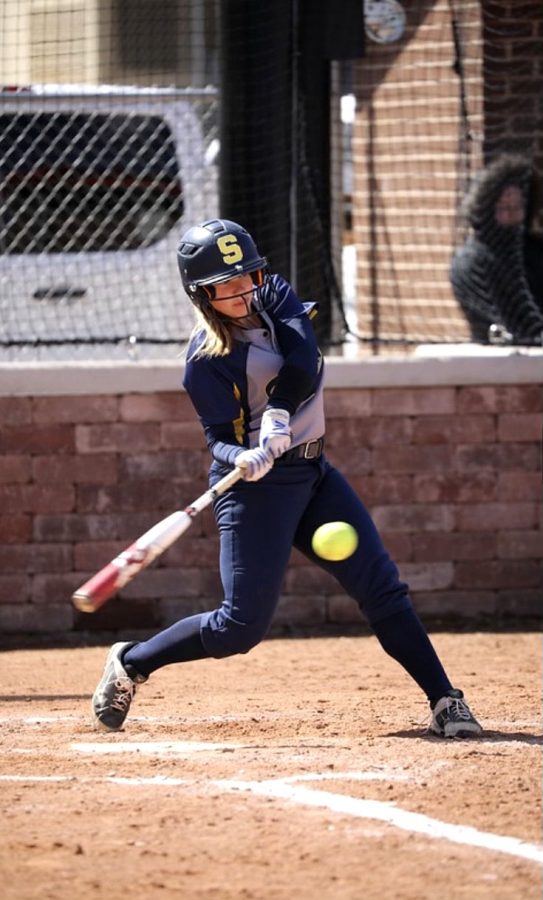“Don’t be soft”: The mental health stigma in athletics
Photo courtesy of Maggie Baumstark
Swinging her bat, senior Maggie Baumstark prepares to score a homerun. Baumstark anticipates the start of a new season following its cancellation this past spring.
November 20, 2020
My fellow athletes can attest: angry coaches screaming fiery insults at us and our teammates is nothing new.
The degree of insult varies, from the creative “I’ve seen better swings on a porch!” to my personal favorite: the pack-up-and-walk-away mid-game.
While I’ve learned to let such impassioned insults roll off the thick skin I’ve built up, there is one in particular that I’ve always had trouble shaking off:
“Don’t be soft.”
As a softball player, I’ve grown up in a culture that says emotions have no place on the field, that feelings should be discarded within a minute of whatever caused them. Any indication of being upset is synonymous with being soft.
While resilience against failure is a valuable lesson for all athletes, this “don’t be soft” mentality becomes a problem when it’s carried off the field and into everyday life.
For most of high school, I did just that. I took on the mentality that emotion equaled weakness, that vulnerability was forbidden.
Every time a painful event came my way, I buried it deep within my psyche to avoid being “soft.” I told myself academic achievement trumped sleep, productivity was more important than self-care and any minute spent dwelling on my emotions was a moment wasted.
The culture of mental toughness that permeates the world of athletics infiltrated my personal life. And it’s not a problem unique to me. Athletic culture drives athletes to paint over their mental health struggles under the guises of “mental toughness” and “perseverance.”
However, the paint is thin and can never truly coat the struggles lying underneath it.
For any athlete who has never heard anything but the “don’t be soft” narrative from the athletic community: I see you, and trust me, you’re not alone in your battle.
Michael Phelps battles clinical depression. Serena Williams the same. Ronda Rousey has contemplated suicide. Abby Wambach has struggled with addiction. Kevin Love deals with an anxiety disorder. If you’re going to tell me that these Olympic-caliber champions are weak, lesser athletes or “soft,” well, email me. Let’s have a conversation.
Mental health is an opponent that many athletes come head to head with, yet it’s a subject cloaked in stigma within the athletic community. It’s our job as athletes to speak openly about the realities of mental health, much like the advocacy group, The Hidden Opponent, does.
Founded by former Division 1 athletes, the group gives athletes a safe space to share mental health and injury struggles, and fosters an atmosphere of encouragement rather than one of cutthroat avoidance of “softness.”
The Hidden Opponent is a beacon of progress in a community so often silent about mental health. However, the conversation isn’t limited to a single organization—it starts here, on our own teams.
Check in on your teammates. Push each other on the field, court, rink or pool, but take a moment when those lights go down to ask them how they are.
Know that it’s okay to take a break. Overloading your schedule isn’t going to fix the weight you’re carrying in your mind.
Listen to your body. If it’s telling you to eat, eat. If it’s telling you to take a day off, take a day off. Your body is the greatest piece of equipment in your sport, and it’s important to take care of it.
If you’ve never heard this before, listen to me closely: Your feelings are valid.
You are not weak.
Vulnerability shows strength.
Your body is beautiful.
You are more than your statistics.
You don’t have to do it on your own.
Reach out for help if you’re struggling.
You are not soft for asking for help.
Allow me to repeat: you are NOT soft for asking for help.
Mental toughness is a concept deeply ingrained in each of us, but the strongest thing someone who is struggling can do is ask for help. Athletes, it’s time to face the hidden opponent head-on.



